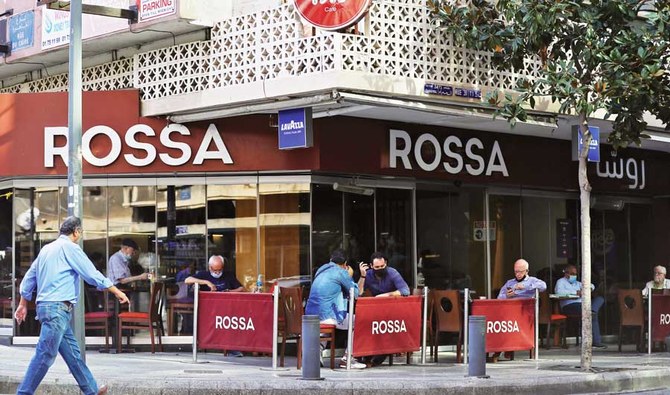
by NAJIA HOUSSARI -- arabnews.com -- BEIRUT: Beirut’s famous sidewalk cafes are facing an uncertain future amid the coronavirus pandemic and dollar exchange rate instability, with employees and owners warning that “the price of a cup of coffee cannot keep pace with the exchange rate.” The recent lockdown, which lasted for two months and 22 days, meant further problems for the capital’s cafes, the place of choice for many Lebanese to relax, wind down and socialize. Many have closed amid the country’s economic turmoil, while several were destroyed in the port explosion last year, and have since been left abandoned. Lebanon’s health measures to stop the spread of coronavirus mean that people are banned from sitting with each other to smoke, sip coffee, chat about affairs or discuss the country’s future. Ali Farhat, 35, an investor in a sidewalk cafe in the Azaria building in downtown Beirut, remembers the “good old times in the area before the protests and the accompanying riots started in late 2019 and the days before the collapse of the Lebanese pound and coronavirus.”
He added: “The area was bustling. The cafe was a place for entertainment, hanging out with people, winding down for half an hour during workdays and having a snack. Everyone back then could afford to sit in a coffee shop. “Today, downtown Beirut is deserted, the employees moved to work from their homes, and my work has become limited to selling cigarettes, coffee and tea to passersby and the security forces guarding downtown Beirut. “The worst financial crisis has caused the prices to soar. As the dollar exchange rose, I stopped selling my goods and closed the store, because the next day, I had to buy goods at a higher price.”
BEIRUT (Reuters) -Lebanon’s top Christian cleric has made unusually direct comments criticizing the Shi’ite Hezbollah movement, accusing it of harming the country …
by middleeastmonitor.com — Lebanese Druze leader Walid Jumblatt has asked why the UN-sponsored talks between Lebanon and Israel on maritime border demarcation …

by dw.com -- Lebanon has been known as "the Switzerland of the Middle East" for decades because of its strict banking secrecy laws. But as the country falls ever deeper into economic crisis and debt, the banks that once drew so much foreign capital to the country are also in trouble. Local economists estimate that altogether, Lebanese banks owe over $90 billion (€77 billion), and say that since late 2019, they have severely restricted withdrawals and foreign transfers, especially in US dollars. There have been many stories about the financial damage done to ordinary Lebanese by these moves as their currency goes into free fall. The Lebanese pound has lost over 85% of its value against the US dollar on the black market. But could potentially insolvent Lebanese banks also spark a dangerous, regional domino effect, causing the same sort of problems for the Middle East as an indebted Greece did for the European Union during the 2008 financial crisis? Billions lost
Late last year, Syrian dictator Bashar Assad blamed his country's ongoing economic woes on the fact that anywhere between $20 billion and $42 billion belonging to Syrian depositors was trapped in Lebanon. Syrian businesspeople have long used Lebanese banks to avoid international sanctions and other restrictions. Earlier in 2020, research by a Yemeni think tank, the Sanaa Center For Strategic Studies, suggested that as much as 20% of Yemen's foreign currency reserves, estimated at around $240 million, were stuck in Lebanese banks. And in the semi-autonomous northern Iraqi region of Kurdistan, politicians claimed that up to $1 billion of money from oil sales was trapped with Lebanon's Bankmed. Lebanese men withdraw money from a Bankmed ATM in the capital, Beirut
Khazen History


Historical Feature:
Churches and Monasteries of the Khazen family

St. Anthony of Padua Church in Ballouneh
Mar Abda Church in Bakaatit Kanaan
Saint Michael Church in Bkaatouta
Saint Therese Church in Qolayaat
Saint Simeon Stylites (مار سمعان العامودي) Church In Ajaltoun
Virgin Mary Church (سيدة المعونات) in Sheilé
Assumption of Mary Church in Ballouneh
1 - The sword of the Maronite Prince
2 - LES KHAZEN CONSULS DE FRANCE
3 - LES MARONITES & LES KHAZEN
4 - LES MAAN & LES KHAZEN
5 - ORIGINE DE LA FAMILLE
Population Movements to Keserwan - The Khazens and The Maans
ما جاء عن الثورة في المقاطعة الكسروانية
ثورة أهالي كسروان على المشايخ الخوازنة وأسبابها
Origins of the "Prince of Maronite" Title
Growing diversity: the Khazin sheiks and the clergy in the first decades of the 18th century
Historical Members:
Barbar Beik El Khazen [English]
Patriach Toubia Kaiss El Khazen(Biography & Life Part1 Part2) (Arabic)
Patriach Youssef Dargham El Khazen (Cont'd)
Cheikh Bishara Jafal El Khazen
Patriarch Youssef Raji El Khazen
The Martyrs Cheikh Philippe & Cheikh Farid El Khazen
Cheikh Nawfal El Khazen (Consul De France)
Cheikh Hossun El Khazen (Consul De France)
Cheikh Abou-Nawfal El Khazen (Consul De France)
Cheikh Francis Abee Nader & his son Yousef
Cheikh Abou-Kanso El Khazen (Consul De France)
Cheikh Abou Nader El Khazen
Cheikh Chafic El Khazen
Cheikh Keserwan El Khazen
Cheikh Serhal El Khazen [English]
Cheikh Rafiq El Khazen [English]
Cheikh Hanna El Khazen
Cheikha Arzi El Khazen
Marie El Khazen